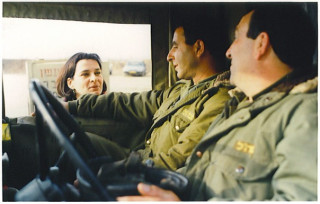
Ever Shot Anyone?
Israel | 1996 | 57 minutes | Color | DVD | Subtitled | Order No. 99481
SYNOPSIS
PRESS
"...a woman director, a feminist, went to join Israeli soldiers...with serious, heavy questions. She came back with a funny, thought-provoking film."
"...reveals a language usually hidden from women,...yet so enchanting to the men trapped by it."
SCREENING HIGHLIGHTS AND AWARDS
- Hong Kong International Film Festival
- Israeli Film Festival, New York
- International Public Television Conference (INPUT '96)
ABOUT FILMMAKER(S)
Michal Aviad was born in Jerusalem and studied literature, philosophy and cinema after graduating high school. During the 1980s she lived in San Francisco, where she started making films, and since returning to Israel in 1991, she has continued to write, direct and produce award-winning documentaries. Her films include: ACTING OUR AGE (1987, USA), THE WOMEN NEXT DOOR (1992, Israel), EVER SHOT ANYONE? (1995, Israel), JENNY & JENNY (1997, Israel), RAMLEH (2001, Israel), and FOR MY CHILDREN (2002, Israel). Aviad’s films examine the complex relationships between women’s issues and the Palestinian-Israeli conflict, militarism, and ethnicity. In November 2019, Aviad was rewarded one of Israel’s most prestigious awards, the Landau Award for Arts and Sciences, endowed by Mifal HaPais Council for the Culture and Arts, which cited her as "one of the most important directors in the history of Israeli cinema." In addition to continuing to make films, Aviad is also a faculty member at Tel Aviv University’s Department of Film and Television where she works as a senior lecturer at the Department of Cinema and Television. (01/20)
